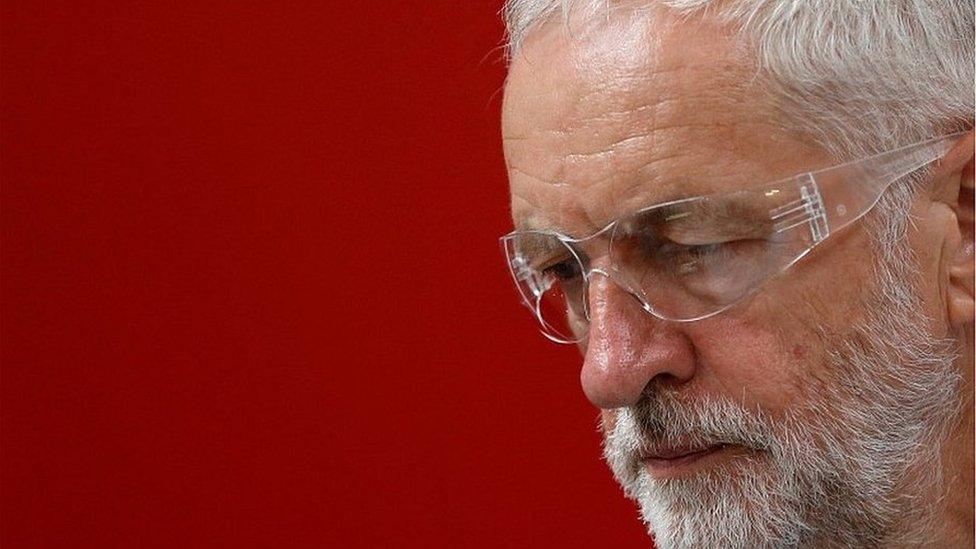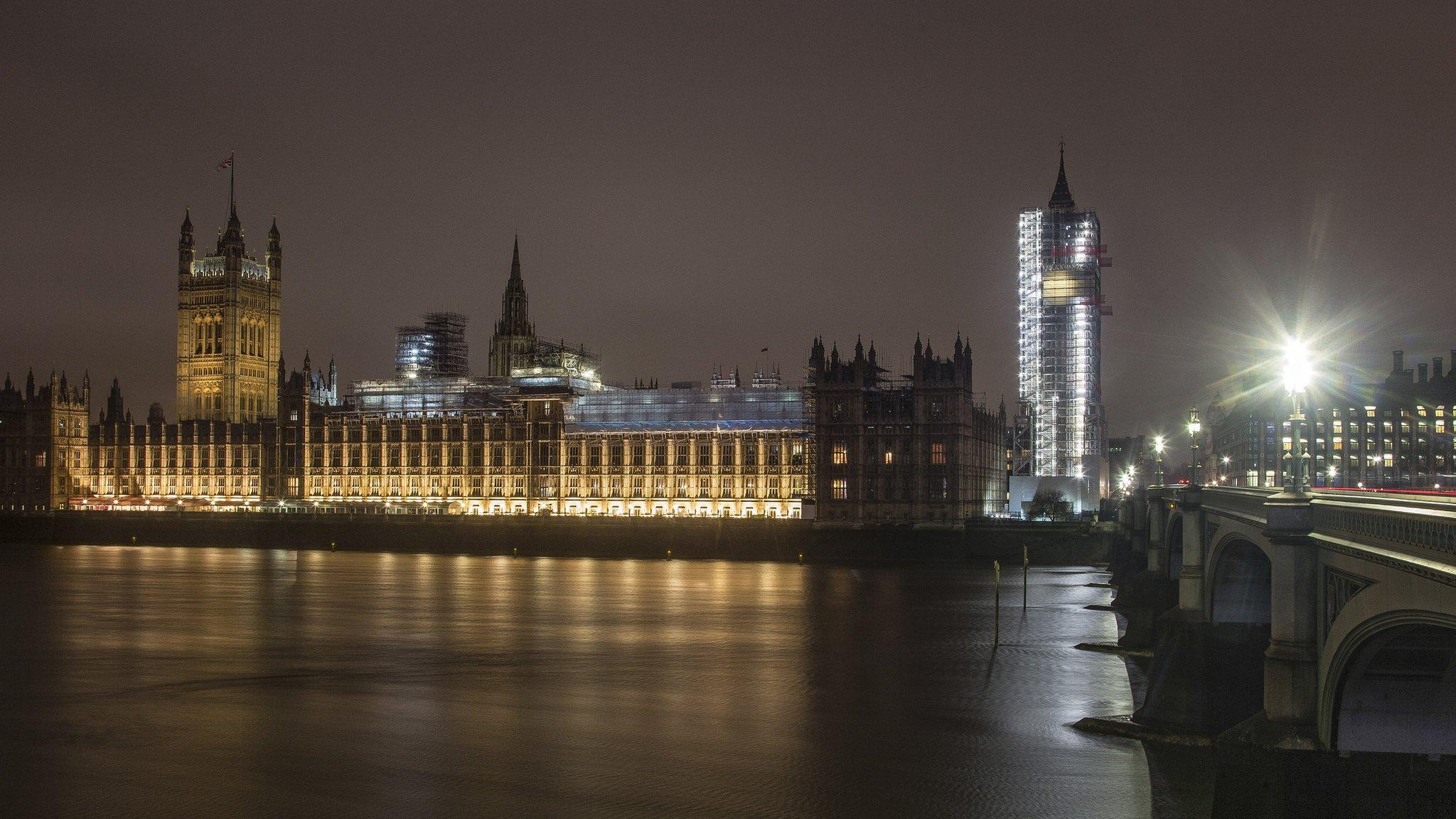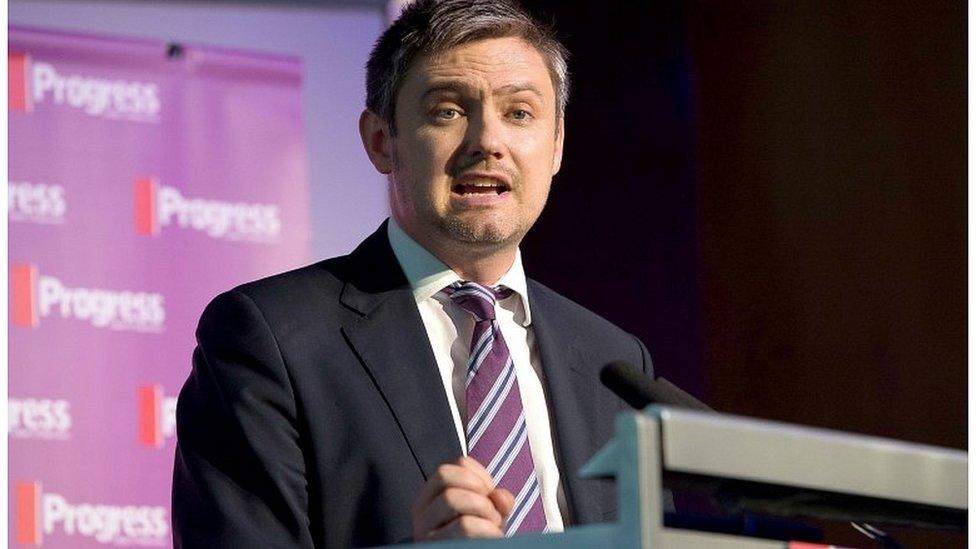Anti-Semitism row: Frank Field considers triggering by-election
- Published
Frank Field says Labour should be a 'champion against racism'
Veteran MP Frank Field has said he is considering triggering a by-election in his Birkenhead constituency.
He resigned the Labour whip over the leadership's handling of anti-Semitism allegations and what he calls "bullying and intimidation" in local parties.
He says he wants to remain a party member and sit as an "independent Labour" MP - Labour says resigning the whip means quitting the party.
His critics say he quit because he was facing deselection by local members.
He recently lost a vote of confidence organised by members angry at his support for the government in Brexit votes.
The leader of Wirral Council, Labour's Phil Davies, is demanding Labour investigate allegations of bullying in the local party.
He claimed Wirral Labour had been taken over by "a small group of hard line extremists that are pursuing a narrow ideological agenda and are using tactics like bullying and intimidation to further that agenda."
Mr Field, who has represented his Merseyside seat since 1979 and won in 2017 with a majority of 25,514, has faced previous efforts to de-select him. He denied he had "jumped before he was pushed" and said he intended to fight the next general election as an independent Labour candidate.
He told The Guardian, external he had been given two weeks to withdraw his resignation or be kicked out of the party at a meeting with Chief Whip Nick Brown.
But Labour sources said this was not the case - and the rules of the party were that if he resigned as a Labour MP, he also resigned his membership of the Labour party at the same time.
Mr Field told BBC Breakfast he would spend the "next few days" deciding whether to stand down as an MP to trigger a by-election, in which he would stand against an official Labour candidate.

Analysis
By Chris Mason, BBC political correspondent
Frank Field's decision to resign the Labour whip once again exposes the divisions at the heart of the Labour Party.
Contrast the reaction of Jeremy Corbyn with his deputy Tom Watson.
In a 12-word, one-sentence reaction, Mr Corbyn did not devote a single syllable to expressing regret at Mr Field's departure.
Mr Watson described Mr Field's announcement as a "serious loss" which reflected "deep divisions," a "sense of drift" and should act as a "major wake-up call."
And now Frank Field is entertaining the idea of a by-election.
Imagine that: the man who has represented Birkenhead for nearly 40 years, versus the Labour Party.
Labour's divisions would be crystallised in one contest, visible to everyone, not just on Merseyside, but much further afield as well.

Mr Field quit the party's parliamentary group through a letter to chief whip Nick Brown on Thursday, saying the leadership was becoming "a force for anti-Semitism in British politics".
A Labour Party spokesman has thanked Mr Field for his service to Labour, but the veteran MP told the BBC he had been thanked "as if I was resigning from a whist club".
The MP also blamed a "culture of intolerance, nastiness and intimidation" in local Labour parties telling the BBC: "I do think that it's sad how the party following his election has really been taken over by the hard left.
"The campaign that Jewish people feel against them by factions of the Labour Party is all part of the intolerance which we also see at a local level."
'Simply crazy'
He said he wanted to remain a Labour Party member and it was "simply crazy" to suggest his decision was "part of a plot".
A Labour source said "Frank has been looking for an excuse to resign for some time".

Is Field facing de-selection?
By BBC North West Political Editor Kevin Fitzpatrick
It seems there is an increasingly toxic atmosphere in a number of Labour constituencies on Merseyside.
Like Frank Field, Angela Eagle, in Wallasey, and Louise Ellman, in Liverpool Riverside, have claimed they've faced bullying and intimidation at their own meetings, predominantly from new members who've recently joined.
For Mr Field, anger over his support for the government in key Brexit votes in July resulted in a no-confidence vote in his local party which he is thought to have lost by 30 votes to 18.
This has no official force within the party and Mr Field's supporters say he remains popular with many members locally but they no longer turn up to party meetings, which, they claim, have been taken over by far left opponents of the MP.
Before the next general election, whenever that may be, Mr Field would no doubt have a major fight on his hands to get re-selected.

Labour's deputy leader Tom Watson described the resignation of Mr Field as a "serious loss to the party" and a "major wake up call".
Labour backbencher John Mann - who also backed the government in Brexit votes and has been a fierce critic of the leadership's stance on anti-Semitism - said he would remain in the party to "fight to the last" but added: "If this isn't sorted, I predict others will go".
And, he added, the Labour leader should announce that all Jewish Labour MPs would be automatically re-selected to fight the next general election "to take this harassment of them off the agenda".
However backbench MP Chris Williamson, an ally of Jeremy Corbyn, told BBC Newsnight: "He (Mr Field) has obviously lost the confidence of his members and he's now getting his excuses in, it seems to me, and throwing around grotesque slurs, which have no basis in reality.
Birkenhead voters react to local MP Frank Field's decision to resign the Labour whip
"The party has taken the issue of anti-Semitism very seriously; far more seriously than any other political party.
"It's so sad to see someone like Frank Field trashing Labour's anti-racist record".
Labour has been dealing with a row about the extent of anti-Semitism within the party for more than two years.
A 2016 inquiry concluded that while the Labour Party was not overrun by anti-Semitism, there was an "occasionally toxic atmosphere".
Recently, the focus has been on a new code of conduct the party has adopted on anti-Semitism, with critics concerned that it does not go as far as the International Holocaust Remembrance Alliance's guidelines.
'Agonising every day'
Next Tuesday, Labour's ruling National Executive Committee is expected to decide whether to adopt the IHRA guidelines in full, with the Parliamentary Labour Party due to be balloted on adopting the complete IHRA document, the day after.
Another Labour MP, Mike Gapes, told the Evening Standard, external he was "agonising every day about the situation and the state of the Labour Party" and was waiting to see what the outcome of the NEC meeting was.
"I will make my own decision about how I deal with this in my own time," he told the newspaper.
Earlier this month, Mr Corbyn again apologised for hurt caused to Jewish people by anti-Semitism in his party and admitted Labour had been too slow in dealing with disciplinary cases.
- Published30 August 2018

- Published11 September 2018

- Published18 July 2018
